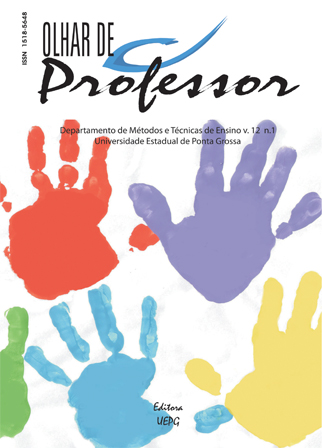REFLEXÕES SOBRE A ESCOLA DE PERÍODO INTEGRAL: ANÁLISE DE UM PROJETO EM DESENVOLVIMENTO NUMA ESCOLA DO INTERIOR PAULISTA - Doi: http://dx.doi.org/10.5212/OlharProfr.v.12i1.147166
Conteúdo do artigo principal
Resumo
A política da escola pública de período integral
se resume na tentativa do sistema educacional público
brasileiro em fortalecer as práticas escolares e valorizar
a formação de um cidadão. Contudo, sua implantação
tem se mostrado de difícil execução, uma vez que envolve
a utilização de muitos recursos financeiros e humanos,
além de formação específica do professor a fim
de conscientizá-lo da função dessa aplicação na escola
para a sociedade. O presente estudo buscou analisar as
concepções de alunos, pais e professores sobre a escola
de tempo integral, cuja política foi implantada em uma
escola do interior paulista desde 1996. A pesquisa foi
realizada em 2006, quando o Projeto atendia duzentos
alunos entre sete e quatorze anos. Questionários foram
elaborados pelos professores e foram estruturados a partir
de questões abertas e fechadas, contemplando tópicos
diferenciados para investigar como os pais, alunos e
professores percebiam as propostas do Projeto e se esse
era valorizado pela comunidade escolar.
Downloads
Detalhes do artigo
Autores que publicam nesta revista concordam com os seguintes termos:
a) Os autores mantêm os direitos autorais e concedem à revista o direito de primeira publicação, com o trabalho simultaneamente licenciado sob a Creative Commons Attribution License Atribuição 4.0 Internacional (CC BY 4.0) que permite o compartilhamento do trabalho com reconhecimento da sua autoria e publicação inicial nesta revista.
b) Os autores são autorizados a assinarem contratos adicionais, separadamente, para distribuição não exclusiva da versão publicada nesta revista (por exemplo, em repositórios institucionais ou capítulos de livros), com reconhecimento da sua autoria e publicação inicial nesta revista).
c) Os autores são estimulados a publicar e distribuir a versão onlline do artigo (por exemplo, em repositórios institucionais ou em sua página pessoal), considerando que isso pode gerar alterações produtivas, bem como aumentar o impacto e as citações do artigo publicado.
d) Esta revista proporciona acesso público a todo o seu conteúdo, uma vez que isso permite uma maior visibilidade e alcance dos artigos e resenhas publicados. Para maiores informações sobre esta abordagem, visite Public Knowledge Project, projeto que desenvolveu este sistema para melhorar a qualidade acadêmica e pública da pesquisa, distribuindo o OJS assim como outros softwares de apoio ao sistema de publicação de acesso público a fontes acadêmicas.
e) Os nomes e endereços de e-mail neste site serão usados exclusivamente para os propósitos da revista, não estando disponíveis para outros fins.
______________

Este obra está licenciado com uma Licença Creative Commons Atribuição 4.0 Internacional.





